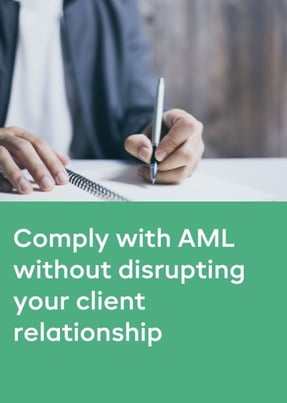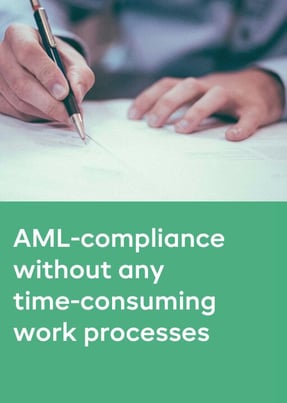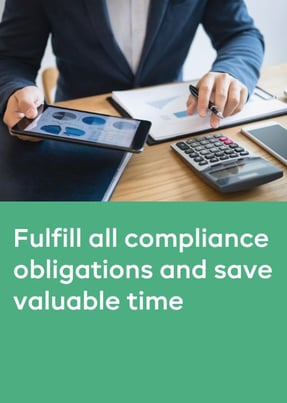RegLab’s specialist x Jonathan

Summary
Every day, our specialists are busy identifying (potential) clients and maintaining existing contacts. Among other things, contact is made, situation sketches are made and tangents are discussed. In this process, clients are encouraged to think about their preparation for a supervisory visit. In this blog, we meet with our multilingual specialist Jonathan. He will talk more about his role as a consultant for Belgium, France and Luxembourg in this blog.
‘My role within RegLab, mainly consists of having and maintaining contact with the heads of law firms in Belgium, Luxembourg and France. On a daily basis, I am busy creating awareness for money laundering prevention in the BeNeLux and France’ - Jonathan
Increased awareness around AML guidelines
By creating more awareness about AML rules in relation to the role of the regulator, clients are more informed about the correct application of the legislation. Every lawyer knows what money laundering prevention is and how the firm can best deal with it. However, not everyone yet sees the need to implement an automated onboarding process. And that is exactly where Jonathan is capitalising on. It is therefore important for our clients to know in advance what our application does, how firms use the application most effectively and how we, as experts, respond to future events surrounding AML regulations.
Today, it is important for both offices and clients to create a smooth onboarding process without spending a lot of extra time. By responding to this, we ensure that both the firm and the client have their records in order quickly. The main purpose of RegLab is to guide clients and educate them about a visit from the regulator.
Making it easier to be AML-compliant
As an office, you should always be just a little better, faster, more effective, or maybe even a little more modern than the competition. The most important thing is to provide excellent service. Jonathan emphasises that when you need a lawyer, it is customary to go to someone you can trust. Someone who will help you with legal conflicts and someone who will take your problems out of your hands. After all, you pay a lot of money for a lawyer. Requesting extra forms, which are necessary for the onboarding process, is then something that firms prefer to minimise. Creating a user-friendly interface where clients easily walk through the KYC process makes it easier for lawyers to work AML-compliant.
By working with the RegLab application instead of an Excel sheet or a CRM system, you can easily see an overview of the client file at a glance. When a certain check then needs to be made from the OVB, the chief of staff or other supervisor, this information can be easily and quickly retrieved. A relevant example is when the supervisor asks the office about the percentage of high-risk clients. In that case, the office can download an up-to-date overview that answers this question with a single click.
‘Many lawyers give clients an extra act by making them fill in different forms. This is necessary bad, but it can be done differently. RegLab supports firms to achieve smooth onboarding’ - Jonathan
Questions answered by our Belgian specialist
Are there certain issues or obstacles that recur structurally in your conversations with clients?
Clients sometimes have questions about the onboarding process, client verification or the UBO register. In such cases, we listen to the client and go through any issues. The biggest obstacle we encounter with firms is that they do not have their AML compliance in place on time. It is not that legislation is not clear, but rather a lack of urgency or the right resources.
Offices do not always see the benefits of having well-documented records, especially if it is not (yet) mandatory. In that case, documentation is more of a nice-to-have than a must-have.
How are clients in Belgium, France and Luxembourg reacting to the RegLab application, especially with regard to AML compliance?
‘What everyone agrees on is that the RegLab application is a great solution for quick and smooth onboarding. The look and feel of the tool is something offices have been looking for for a long time. It looks professional and is easy to use. Of course, the tool is also built specifically for lawyers. Generally, lawyers have to make do with a solution made for others, which will then hopefully apply to lawyers. A tool developed specifically for lawyers is a one-off.’
How do AML guidelines differ in Belgium, France and Luxembourg. And what do they mainly focus on?
‘The AML guidelines are the same for the aforementioned three countries. This is because the countries fall under European legislation. I do notice that most countries look at the AML directives with a different perspective. Offices in Luxembourg mainly focus their time on questionnaires imposed on law firms by the Luxembourg Bar Association. In addition, these firms also focus on identifying adverse media. Luxembourg is a lot more consistent in this as they have been working on the obligations around AML for a long time.
France, on the other hand, focuses more on the client. There, they understand the regulations applicable to money laundering prevention well and are shifting the focus to a more client-centric approach. French firms like to focus on getting to know clients and are busy requesting information in a client-friendly way. A good relationship with a client will be accompanied by a polite but not direct way of working.
In Belgium, firms take a more theoretical approach in applying the AML guidelines. The Order of the Flemish Bars (OVB) has developed an informative expression that is also used by firms. In Belgium, communication between lawyer and client will be more in a formal and businesslike tone. When someone needs legal assistance, it is a must to use a competent lawyer.
Should a KYC investigation be conducted at all times?
‘Basically, you have to identify every client in a critical way. Regardless of the type of client or the relationship you have with the client. When we are asked by firms whether a KYC review should always be conducted, I routinely turn the question around with an example:
Imagine this: an old acquaintance of a client wants to hire you as a lawyer. You know the person via via, but are not aware of the name of his limited company. Still, you consider taking the case. You request all name and contact details and receive the name of his private limited company. To your surprise, it turns out to be called ‘Money Laundering in Antwerp BV’, also known as ‘GW in Antwerp’.
Would you then conduct a KYC investigation on this client?’
About Jonathan
Jonathan is RegLab's is our multilingual specialist for Belgium, Luxembourg and France. Based in Belgium, he is at the centre of his clients and their queries. Because of his cheerful and chatty attitude, he is a strategic match for both existing and new clients. He is therefore an important link in our international collaborations!






